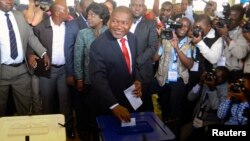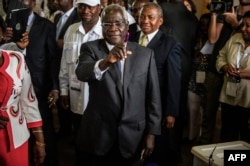Mozambique’s October elections were supposed to have taken the southern African nation off the ledge of instability and political bickering. But in recent months the gas-rich nation has seen more political turmoil. As the new parliament kicks off this week and the new president takes his seat, political problems continue to bedevil Mozambique.
From all outward appearances, the engines of democracy are chugging along in the Southern African nation of Mozambique, after a successful October election.
Mozambique’s new parliament sat for the first time Monday, and new president Felipe Nyusi takes the helm on Thursday January 15. He comfortably won last year’s poll, with about 57 percent of the vote.
But although the wheels are turning, there may be problems. Top opposition figure Afonso Dhlakama this week threatened to secede and declare himself president of the “Republic of Central and Northern Mozambique.” He also led a boycott of Monday’s parliamentary session, keeping away RENAMO’s 89 representatives in the 250-seat parliament.
A nation in crisis
Top journalist and commentator Fernando Lima says on day one of the new legislature, the nation has a crisis on its hands.
“We have a political crisis in the country since Mr. Afonso Dhlakama, the head of RENAMO, is proclaiming a new state for the provinces of the center and northern part of the country," he said, speaking to VOA News via Skype from Mozambique’s capital. "Of course, this should not be understood as a secessionist claim. It is more of a negotiating effort with government. Still, it is a major crisis within our political system.”
Dhlakama says Nyusi’s party, FRELIMO, rigged the polls, a move that lost him his fifth successive run for the presidency. But international observers said October’s polls were largely free and fair and any irregularities were isolated incidents, not symptoms of coordinated rigging.
Dhlakama took control of the RENAMO party in 1979, during the early years of Mozambique’s long civil war. That conflict also served as a Cold War proxy battle, and drew in other nations that supported RENAMO’s right-wing, anti-communist stance.
Mozambique analyst University of South Africa Professor Shadrack Gutto says Dhlakama’s political tactics are outdated.
“I think Alfonso Dhlakama [needs] to learn, to know that these are not the days like we had before 1990 when he could easily get support from Western countries and South Africa and so on. Things have changed in the region,” said Gutto.
Need for political dialogue
Journalist Lima says talking is the way forward in modern Mozambique. He urged the new president to negotiate with RENAMO, which won 37 percent of votes, doubling its share from the 16 percent it won in the previous election in 2009.
“The point is, there should be some kind of political dialogue in order to bring in RENAMO, because RENAMO had proved, and the figures are in evidence of that, that it is a major party and it is a major player in the politics of Mozambique,” said Lima.
He says the people of Mozambique want to shed their image as a troubled African hotspot and embrace their future as a gas producer. In short, what both of these parties promised to do when they ran for office.













